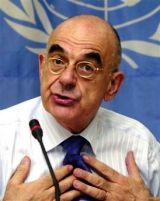Darfur talks should be behind closed door- UN envoy
By Opheera McDoom
KHARTOUM, June 14 (Reuters) – Darfur peace talks in Nigeria should be held behind closed doors and exclude both Western nations, and neighbouring countries trying to further their own interests, the top U.N. envoy in Sudan said on Tuesday.

The talks should see tangible progress by July 9, when a new constitution will be approved, and the warring parties may reach a deal by the end of the year, Jan Pronk told reporters.
“I’m saying that in the direction of Western countries … please stay away a little bit and of course to African countries, Eritrea and Chad, neighbouring countries,” he said.
“(These) countries should exercise restraint and leave it to (the mediator),” he said. “Other countries should not complicate matters by trying to get their own interests … supported in the talks.”
A fifth round of African Union-sponsored peace talks between the two main rebel groups and the government resumed in the Nigerian capital Abuja on Friday after a 6-month break. The talks had stalled over Eritrea and Chad’s role in the talks.
Eritrea hosts the two rebel groups and most other Sudanese opposition movements. Chad houses more than 200,000 Darfur refugees who fled the conflict, which began in early 2003.
Pronk said the opening speech by the government delegation was constructive but speeches by the two insurgent groups were aggressive, though less so than in the previous round.
Tens of thousands have been killed and 2 million have fled their homes in more than 2 years of open revolt in Darfur.
The U.N. Security Council has asked the International Criminal Court (ICC) to investigate alleged war crimes in the western region, the first such referral. Sudan refuses to send any citizen to the court, based in The Hague.
Pronk said he was pleased Sudan had decided to form a special court to try crimes in Darfur but it was too late to avert the ICC process of investigation and indictment.
The treaty which formed the ICC states that any suspect tried in credible and fair proceedings in a national court cannot then be retried in The Hague.
“It’s positive but it cannot be a substitute for the ICC just as the ICC is not a substitute for domestic courts,” he said. “Both tracks have to be followed.”
The government says its national trials will be credible and will be a substitute for the ICC, which announced last week the formal launch of its investigation in Darfur.
Pronk said those concerned about the credibility of the national court, which begins proceedings on June 15, should give the government the benefit of the doubt.
“If the government takes a decision to do something which it had been asked to do late, you only have to criticise that they are late, you should not criticise that they are doing it,” he said. “So give the government the benefit of the doubt.”
